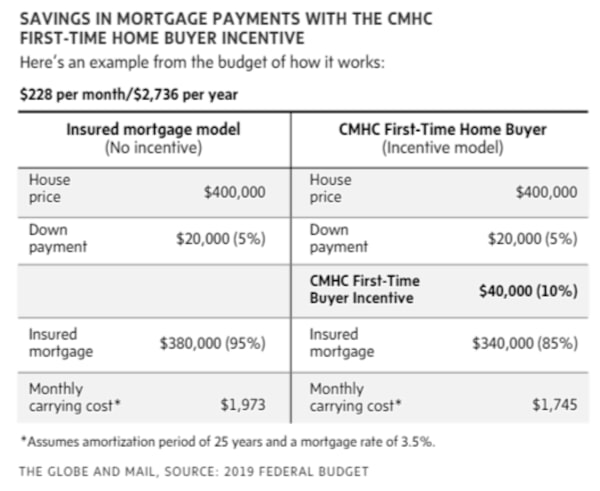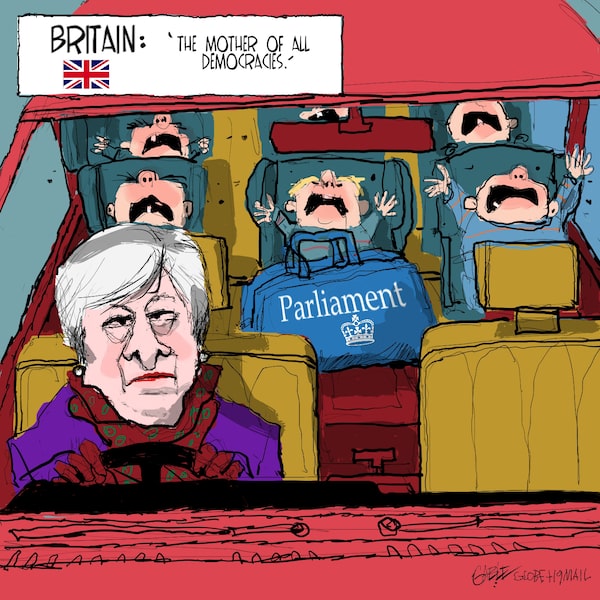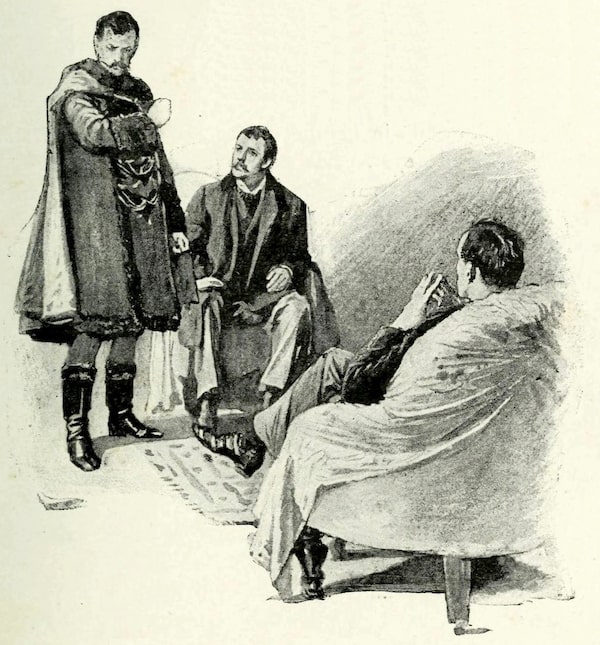Good morning,
These are the top stories:
Federal budget 2019: Here’s a closer look at what the Liberal government unveiled
The Liberals have delivered a budget that ignores earlier promises to run short-term deficits, instead putting $22.8-billion toward issues that affect key voters ahead of the fall federal election. Among the moves: Easing student debt; new money for skills training; funds to settle Indigenous land claims; and seniors’ assistance. But it’s the budget’s measures to address housing affordability that are garnering the most talk – both in praise and skepticism.
The key change is a three-year program of zero-interest loans for first-time home buyers, with purchases limited to just below $480,000. Those with annual household incomes of $120,000 or less will be eligible to get loans of up to 10 per cent of the purchase price of newly built homes and 5 per cent of existing homes. The loans will be repayable when the mortgage is repaid. Here’s an example of how it would work:

The Globe and Mail
The real estate sector praised the changes, saying they will help buyers who were adversely affected by the stress-test rule that made it harder to qualify for mortgages.
But while the loan program looks good on paper, David Parkinson argues that it might not do much to improve affordability. That’s because it will increase demand immediately, with supply taking longer to catch up. “It doesn’t take a PhD in economics to figure out that higher demand, in the absence of matching supply, will inflate prices. The help the government is offering new buyers could very quickly be wiped out by rising prices.” (for subscribers)
Additionally, Parkinson says, the move doubles down on the economy’s biggest risk: record-high levels of household debt.
First-time buyers will also be able to withdraw up to $35,000 from registered retirement savings plans to put toward a home purchase, an increase from the existing $25,000 limit. Rob Carrick is more bullish on the zero-interest loans plan, but cautions against the Home Buyers’ Plan, saying it “encourages young people who are smart enough to start saving for retirement to undo that good work so they can buy a house.” (for subscribers)
Breaking down the other budget highlights
Seniors: About 40,000 people age 70 or older aren’t enrolled in the Canada Pension Plan, so the Liberals are proposing to proactively enroll all eligible seniors. There’s also a proposal to boost the guaranteed income supplement exemption for low-income seniors, plus funds for a new National Dementia Strategy.
Pharmacare: The government is promising to create a new drug agency that would eventually spend up to $500-million a year for expensive medicine for rare diseases. But a national pharmacare program appears to be a more distant goal.
Students: Interest rates on student loans will be reduced, and the interest charges that accumulate during the six-month grace period after graduation will be eliminated.
Skills: Canadians are set to be eligible for a $250 yearly credit to put toward skills training, plus up to four weeks of income support every four years while on training and without regular pay.
Indigenous programs: A total of $4.7-billion over six years has been allocated for settling land claims, expanding health and social services for First Nations children, and eliminating drinking-water advisories on reserves.
The border: The RCMP, CBSA and other agencies will receive funds to address the spike in unauthorized crossings by asylum seekers headed north amid Donald Trump’s immigration crackdown. (for subscribers)
This is the daily Morning Update newsletter. If you’re reading this on the web, or it was forwarded to you from someone else, you can sign up for Morning Update and more than 20 more Globe newsletters on our newsletter signup page.
The Liberals have shut down hearings into the SNC-Lavalin affair
The Liberals used their majority on the justice committee yesterday to prevent attorney-general Jody Wilson-Raybould from coming back to testify. Conservatives responded with uproar, chanting “cover-up” as they used procedural tactics to delay Finance Minister Bill Morneau’s budget speech. (for subscribers)
Liberals, including Prime Minister Justin Trudeau, are arguing that enough witnesses have been called and that the issue should now be left to a probe by the Ethics Commissioner. But in a letter to her constituents last week, Wilson-Raybould said “further clarity and information is needed.”
Here’s John Ibbitson’s view: “Trudeau must be hoping that by terminating the hearings, he will starve this controversy of political oxygen. He will fail, just as his government has failed in every attempt to smother this scandal.” (for subscribers)
Albertans will head to the polls for a provincial election on April 16
Alberta’s NDP government dropped the writ yesterday, just as United Conservative Party Leader Jason Kenney faces attacks over his party’s 2017 leadership race. In 2015, Rachel Notley’s NDP ended 44 straight years of Progressive Conservative rule in the province. That prompted the merging of two right-leaning parties, the PCs and Wildrose, to merge under the UCP banner.
The elections commissioner and the RCMP are now looking into donations into one of Kenney’s UCP rivals, Jeff Callaway. Leaks also show that Kenney’s leadership campaign actively helped Callaway during the leadership race. Kenney has denied wrongdoing.
Meanwhile, UCP candidate Caylan Ford has resigned after online comments surfaced that showed her saying she was “saddened” by the replacement of white people in their “homelands.”
In a column, Gary Mason says an election that was supposed to be a foregone conclusion is now anything but: “It was thought that only a scandal of a significant nature could derail the UCP’s path to power; the Conservatives would have to extend a hand up to the NDP to make the race competitive. And wouldn’t you know it, that’s exactly what they’ve done.” (for subscribers)
Got a news tip that you’d like us to look into? E-mail us at tips@globeandmail.com Need to share documents securely? Reach out via SecureDrop
ALSO IN THE NEWS
Relatives of those killed in the deadly New Zealand mosque shootings have begun to bury their dead. The country’s Prime Minister, Jacinda Ardern, has urged for the public and media to focus on the victims, and not the white supremacist who perpetrated the massacre.
About 10,000 Canadians will apply to get free pardons for cannabis-possession convictions, Ottawa is estimating. There are about 250,000 convictions, but some of those individuals have died, while those who have different criminal charges on their record aren’t expected to apply.
MORNING MARKETS
Markets mixed
Global shares faced an end to their longest winning streak of the year as investors took profits on Wednesday before the U.S. Federal Reserve’s policy decision, seen as offering clues to interest rate prospects over the coming year. Tokyo’s Nikkei gained 0.2 per cent, while Hong Kong’s Hang Seng lost 0.5 per cent, and the Shanghai Composite dipped slightly. In Europe, London’s FTSE 100 and the Paris CAC 40 were up by less than 0.1 per cent by about 6:50 a.m. ET, with Germany’s DAX down 1.2 per cent. New York futures were up marginally. The Canadian dollar was about 75 US cents.
WHAT EVERYONE’S TALKING ABOUT
Relax: An asteroid will just miss hitting Earth. But our actions could still have a deep impact
Michael Byers and Aaron Boley: “On Wednesday evening, depending on where in Canada you are, you might be leaving school or work, having dinner, or already fast asleep in bed. Meanwhile, an asteroid the size of a seven-storey building – designated 2019 EA2, to reflect the fact that it is the second asteroid to pass close to Earth this year, and spotted just two weeks ago through a telescope in Arizona – will buzz by the planet we call home. The good news? The 24-metre-wide asteroid will miss us by 300,000 kilometres. The bad news: asteroids do hit the Earth.” Michael Byers and Aaron Boley co-direct the Outer Space Institute at the University of British Columbia.
We should ban cellphones from classrooms – and the research backs that up
Paul W. Bennett: “A cellphone ban during instructional time will decisively address one of the most stubborn issues confronting teachers in today’s classrooms. Dismissing it only serves to ignore the evidence-based research: that students’ fascination and, at times, their obsession with mobile devices is adversely affecting their performance, cognitive capacities, concentration and well-being.” Paul W. Bennett, Ed.D., is the director of the Schoolhouse Institute in Halifax.
Trump has put Trudeau in a bind, again
Lawrence Martin: “The Trudeau government wants Donald Trump to remove his punitive steel and aluminum tariffs – and pronto. Instead of seeing the President of the so-called free world cozying up to authoritarian leaders, the latest being Brazilian President Jair Bolsonaro, Ottawa wants that goodwill sent the way of the best friend and neighbour. But to hear Canadian diplomats tell it, chances of the levies being lifted are dwindling.” (for subscribers)
TODAY’S EDITORIAL CARTOON

(Brian Gable/The Globe and Mail)TGAM
LIVING BETTER
Why doctors are so reluctant to use e-mail with patients
Wondering why your doctor’s office requires you to book an appointment to ask a simple health question? One reason, writes Paul Taylor, is that your physician is concerned about ending up on call 24/7. Another is that most provinces and territories don’t pay doctors for sending e-mails, with B.C. being the notable exception.
MOMENT IN TIME
Sherlock Holmes’s A Scandal in Bohemia begins

This illustration, by Sidney Paget, accompanied Holmes's A Scandal in Bohemia in The Strand Magazine in July, 1891. (The Strand Magazine)The Strand Magazine
March 20, 1888: Arthur Conan Doyle created his immortal “consulting detective” Sherlock Holmes, and Holmes’s trusty friend and amanuensis, Dr. Watson, in 1886, with the novel A Study in Scarlet (in early drafts, the protagonist’s name was Sheridan Hope). He followed that with another Holmes novel, The Sign of the Four, and then, in 1891, with A Scandal in Bohemia, the first of 56 short stories about the ultrarational, hyperobservant and often supercilious pipe-smoking sleuth (there were also two later novels). The story begins on this date in 1888, with the arrival of a mysterious masked man at Holmes’s London flat at 221B Baker St. The incognito visitor has barely begun his request of the detective’s services when Holmes deduces that the man is none other than the King of Bohemia – who, it transpires, believes he is being blackmailed by his former mistress, American opera singer Irene Adler, over a compromising photograph. As narrated by Watson, A Scandal in Bohemia unfolds over the following two days with no shortage of disguise, mystery and subterfuge. It was the publication of this brief story, more than the two earlier full-length novels, that catapulted Holmes, Watson and, of course, Conan Doyle himself to enduring international fame. – Christopher Harris
If you’d like to receive this newsletter by e-mail every weekday morning, go here to sign up. If you have any feedback, send us a note.
 Arik Ligeti
Arik Ligeti